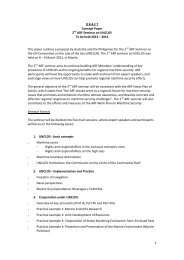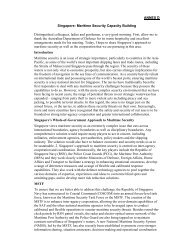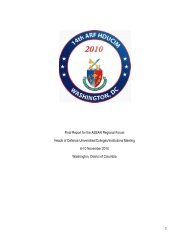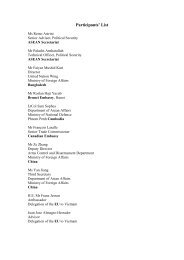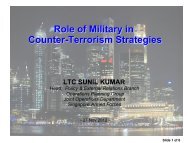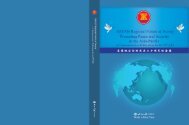CO-CHAIRS' SUMMARY REPORT OF THE ARF SEMINAR ON LAWS AND ...
CO-CHAIRS' SUMMARY REPORT OF THE ARF SEMINAR ON LAWS AND ...
CO-CHAIRS' SUMMARY REPORT OF THE ARF SEMINAR ON LAWS AND ...
Create successful ePaper yourself
Turn your PDF publications into a flip-book with our unique Google optimized e-Paper software.
<strong>CO</strong>-CHAIRS’ <strong>SUMMARY</strong> <strong>REPORT</strong><strong>OF</strong> <strong>THE</strong><strong>ARF</strong> <strong>SEMINAR</strong> <strong>ON</strong> <strong>LAWS</strong> <strong>AND</strong> REGULATI<strong>ON</strong>S <strong>ON</strong> <strong>THE</strong>PARTICIPATI<strong>ON</strong> IN INTERNATI<strong>ON</strong>AL DISASTER RELIEFBY ARMED FORCESIntroduction22-25 APRIL 2009, BEIJING1 The ASEAN Regional Forum (<strong>ARF</strong>) Seminar on Laws and Regulations in HumanitarianAssistance and Disaster Relief (HADR) was held in Beijing, China from 22 to 24 Apr 09,cohostedby the Ministry of National Defence(MOD), PRC and Ministry of Defence Singapore, andorganized by PLA National Defence University, PRC. The theme of the seminar was laws andregulations building on the participation in international disaster relief of the armed forces of <strong>ARF</strong>members.2 The seminar was attended by <strong>ARF</strong> members from Australia, Brunei Darussalam,Cambodia, Canada, China, European Union, India, Indonesia, Japan, The Democratic People’sRepublic of Korea, the Republic of Korea, Laos, Malaysia, Mongolia, Pakistan, Russia,Singapore, Thailand, the United States, and Vietnam. A representative from the <strong>ARF</strong> Unit of theASEAN Secretariat also participated in the seminar.Item 1: Opening Ceremony3 The Seminar was officially opened by Senior Captain Guan Youfei, Deputy Chief of theForeign Affairs Office of MOD, and co-chaired by MG Zhu Chenhu, Director General, AcademicDepartment of Strategic Studies, PLA National Defence University, PRC, and BG Jimmy Tan,Commandant SAFTI Military Institute of the Singapore Armed Forces .Item 2: Adoption of Agenda4 The Seminar discussed and adopted the Agenda.Item 3: Stocktake of <strong>ARF</strong> HADR Cooperation5 The representative from the <strong>ARF</strong> Unit of the ASEAN Secretariat gave an overview of theexisting <strong>ARF</strong> structures, established frameworks and cooperative activities for HADR. Shehighlighted the renewed interests within the <strong>ARF</strong> to pursue cooperation in HADR following theBoxing Day tsunami of 2004 and noted the revival of the <strong>ARF</strong> Inter-Sessional Seminar onDisaster Relief. She noted that the 13 th <strong>ARF</strong> in July 2006 had adopted a statement on “DisasterManagement and Emergency Response” which provided an overarching framework forcooperation under the ambit of the <strong>ARF</strong>, as well as a set of General Guidelines for <strong>ARF</strong>Cooperation in HADR Operations during the 14 th <strong>ARF</strong> in July 2007. The <strong>ARF</strong> Unit alsohighlighted that work was in progress for the <strong>ARF</strong> to eventually develop an <strong>ARF</strong> StrategicGuidance for HADR which includes elements of the <strong>ARF</strong> Standby Arrangements. She updated theseminar that the US and the Philippines are co-hosting a Voluntary Demonstration of Response(VDR) on Disaster Relief in Central Luzon in May 2009. The <strong>ARF</strong> was also working towards an<strong>ARF</strong> Workplan on Disaster Relief for approval by the 16 th <strong>ARF</strong> Ministers Meeting in July 2009.Item 4: Experiences of Militaries in HADR Operations1
6 The seminar noted that the Asia-Pacific region was faced with a frequent occurrence ofnatural disasters and calamities that resulted in significant loss of lives as well as damages toproperty and infrastructures. The seminar exchanged views on the roles and experiences of themilitaries of <strong>ARF</strong> members in HADR operations and their national legal frameworks ofmobilization for disaster relief efforts within their own countries, as well as for deploying to othercountries. It was noted that militaries played different roles in HADR operations in differentcountries – in some countries the militaries were the main institution while, in others, it was thecivil agencies that took the lead with the militaries play a supporting and complementary role.7 Participants recognised that militaries possessed both the capacity and capability to playan important role in disaster relief efforts. <strong>ARF</strong> member states have established to some extentrelevant domestic laws and regulations, coordinated with its own national laws and characteristics.There is a rough basis for military cooperation and exchanges among the member states. Militariescan provide manpower on the ground, which can greatly speed up the overall response time.Militaries can also provide technical expertise, equipment as well as logistics and medical supportto enhance the delivery of aid supplies and rescue services. In areas with heavy infrastructuraldamage, militaries can help to re-establish communications linkages.8 It was clear that militaries could make a significant difference in helping to manage theconsequences of disasters, ensuring that the loss of life and suffering is minimized and thatreconstruction, recovery and a return to normalcy can take place quickly. The seminar, however,acknowledged that militaries should only be used as the last resort, and not play a long-termsustained role in HADR reconstruction. This was a role that is best left to the civil agencies.Item 5: Legal Challenges faced by Militaries in Undertaking Disaster Relief Operations9 The seminar noted that there were many regimes governing HADR cooperation as well asthe use of military and civil defence assets. At the national level, some countries had adopteddomestic laws and regulations that guide the use of the armed forces as well as their operations ina disaster situation. Others, however, had developed internal standard operating procedures thatfacilitated the use of the military.10 At the international level, the seminar noted that the UN provided a comprehensiveframework for cooperation under the Guidelines on the Use of Military and Civil Defence Assetsin Disaster Relief (“Oslo Guidelines”). At the same time, regional frameworks for cooperation,such as those under the ambit of ASEAN and the <strong>ARF</strong> had emerged to facilitate HADRcooperation.11 The seminar recalled that it was important to respect the international norms of behaviourand principles for cooperation in disaster relief operations. These principles included that theaffected country has the primary responsibility in responding to disasters occurring within itsterritory in a prompt and effective manner; where needed, the affected country shall facilitateexternal assistance from other countries and international organisations in its HADR efforts toachieve the objective of prompt and effective disaster management and relief; and that externalassistance shall be provided with the consent of the affected country, and the HADR efforts shouldbe under its overall control and supervision. The seminar also noted the importance to abide bythe humanitarian principles of humanity, neutrality and impartiality.12 The seminar noted that the militaries could face a series of legal issues in HADRoperations. Some of these included the provision of security which was a responsibility of theaffected states, the implementation of the appropriate rules of engagement, the wearing of uniformand the appropriate carriage of weapons. The other legal challenges included the issues ofprivileges and immunities and the need to secure diplomatic clearances and over-flight rightsexpediently as well as issues relating to customs, taxes and duties, and claims and other disputemechanisms.2
13 The seminar recognised that there was no one-size-fits-all legal model and frameworkgiven that countries had different political systems and cultures as well as national policies thatgovern the offer of assistance or the acceptance of disaster relief assistance. Nonetheless, weneeded to address how we could reconcile the different frameworks and legal regimes that weoperated under. We also needed to ensure that frameworks and laws adopted are practical andimplementable for the operational agencies. This would allow us to ensure a coherent, coordinatedand timely humanitarian response.Item 6: Suggestions for Enhancing International HADR Cooperation14 The seminar acknowledged the <strong>ARF</strong>’s contributions to encouraging regional andinternational cooperation in mitigating and responding to natural disasters in the region. Theseminar agreed that existing <strong>ARF</strong> frameworks and initiatives had been useful in building capacityand establishing the basic principles and modus operandi for HADR cooperation. The seminaralso expressed support for the <strong>ARF</strong> Strategic Guidelines for HADR and <strong>ARF</strong> Disaster ReliefWorkplan, which are in the process of being finalised.15 Recognising that many <strong>ARF</strong> countries were in a region prone to natural disasters, theseminar acknowledged disaster relief must be driven by need; Security is the primaryresponsibility of affected country; It should be under the request from the government of theaffected country; that it was necessary for <strong>ARF</strong> participants to implement the various mechanismsthat had been adopted by the <strong>ARF</strong> to facilitate HADR cooperation, such as the <strong>ARF</strong> GeneralGuidelines on Disaster Relief Cooperation. The seminar also called for the discussions on the<strong>ARF</strong> Strategic Guidance for HADR to be concluded quickly for adoption as this was an importantmechanism that would assist <strong>ARF</strong> participants in HADR cooperation. The seminar also urged<strong>ARF</strong> participants to review the respected national legal frameworks and to assess if there was aneed to rationalise them with existing international and regional regimes.16 Apart from strengthening the legal frameworks, the seminar noted the importance andneed for the <strong>ARF</strong> participants to build both national and regional capacities so that we could betterdeal with the challenges posed by natural disasters. It was also suggested that there was a need toestablish emergency response standby arrangements to facilitate disaster relief efforts. Theseminar further noted the necessity for the <strong>ARF</strong> to intensify its cooperation and to move beyonddialogue and to build practical cooperation. The seminar further noted that the armed forces ontheir own would not have the full capacities to deal with disaster relief operations and would needto work closely together with other civilian agencies. The operational procedures that the <strong>ARF</strong>was working on would facilitate better understanding and cooperation among <strong>ARF</strong> defenceestablishments and civilian agencies tasked with relief efforts.17 In order to promote the development of the laws and regulations for HADR by the armedforces. It is desirable that following steps can be taken initially such as: Speeding up thesystematic domestic legislation to facilitate armed forces participation in HADR operation;Pushing forward the development of related regional and international laws and regulationsbuilding; Formulating legally-binding bilateral agreements or non-legally binding bilateralarrangements; Enhancing cooperation and exchanges in the research of relevant laws andregulations establishment.18 Apart from the formal presentations, the US briefed the seminar on the US-Indonesia cosponsoredconcept paper and draft text, proposing for an <strong>ARF</strong> Model Agreement on the Use fMilitary and Civil Defence Assets (MCDA). Vietnam and South Korea also respectively submittedpapers related to the topic of the seminar.Item 7: Closing Remarks19 BG Tan expressed his appreciation to the officials for their active participation andvaluable insights which had contributed to a fruitful and meaningful seminar. BG Tan highlightedthe need to take a broader perspective and adopt an overarching framework for HADR3
cooperation that was capable of reconciling international and regional laws on disaster reliefassistance.20 MG Zhu was very grateful to BG Tan for his excellent cooperation in their co-chairing ofthe seminar. He hoped that what was achieved in the seminar would be helpful to the promotion ofthe building of laws and regulations by armed forces in international HADR operations.21 The seminar thanked the Government of the People’s Republic of China for the generoushospitality and the excellent arrangements made for the delegates.4


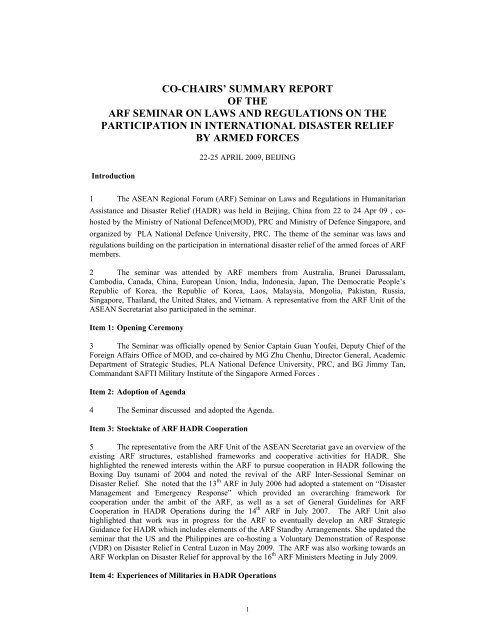
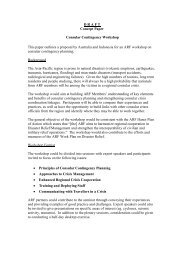
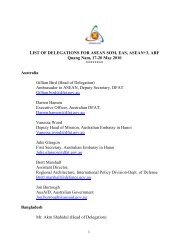
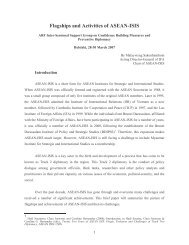
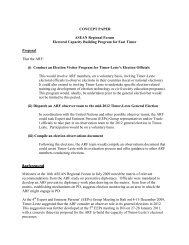
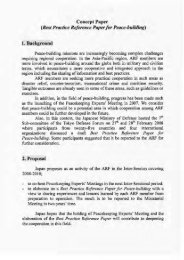
![10 ASAIN Presentation [Pakistan].pdf - ASEAN Regional Forum](https://img.yumpu.com/50649810/1/190x143/10-asain-presentation-pakistanpdf-asean-regional-forum.jpg?quality=85)
